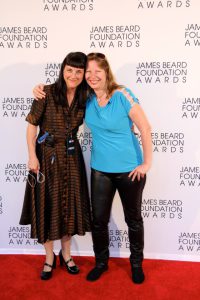Q: What do you currently do within the media industry?
I have worn many media hats over the last 23 years. I am currently directing and co-producing a feature documentary called “America’s First Foodie: the Incredible Life of James Beard”. We have been running a Kickstarter campaign that will end on November 6th which will allow us begin post-production and we are hoping for a spring 2015 release. I have also been teaching media literacy and production since 1987. My students range in age from 8-80. I love teaching because I not only get an opportunity to inspire new media makers but I am constantly inspired by my students.
Q. What first inspired you to work in media?
I was an art major in college but was also very involved in environmental activism. After graduating I began working for Greenpeace in New York City. Greenpeace used media to get their message out more effectively than almost any other environmental organization working at that time. I realized that non-fiction media making would be a great way for me to combine my creative needs with my desire to work in social justice.

Q. How do you feel your experience as a woman has impacted the way you approach film-making?
In 2003, I began co-directing/producing a film called “Neither Here Nor There” about a Bosnian refugee woman and her 3 children living in Columbia Missouri. I think being a woman documenting a Muslim woman’s story gave me more access than a male director might have had. I made the film with 2 other women and 1 man. There were many times when it was not appropriate for Steve to shoot a particular scene and it was fortunate that my co-directors Beth and Kerry and i were able to get what we needed.
Q: Do you find it challenging to be a female director in a male dominated industry or have you not been affected by that?
I have been producing and directing my own films and television programs since 1991. I have been fortunate to be able work with supportive crews of both sexes. I can’t say that I have been affected by gender politics but I also haven’t wanted to work in Hollywood and have no experience in that professional environment.
Q. What would you consider one of your personal professional victories?
I would say that the accomplishment I am most proud of is Columbia Access Television, the public access station I started in Columbia Missouri. I have been a supporter of public access media for as long as I have been making it. I feel very passionate about local access centers that can bring training and equipment to all people in all communities. When I arrived in Columbia in 2001, they had no media access center even though the cable companies were required by city code to provide equipment and training to the community and they just weren’t doing it. I formed an organization and recruited my friends in the production and education communities and we successfully waged a campaign to bring back public access. In 2004, CAT TV hit the air and they just celebrated their 10th anniversary.
Q. What would you say to any aspiring female filmmaker (or media professional) out there?
I would suggest that aspiring female filmmakers always remember to trust their instincts and voices. I would also tell all aspiring filmmakers that directors and producers appreciate hard work and professionalism over everything else. You need to be willing to start at the bottom and be assertive. If you have an internship, make sure you are always looking for learning opportunities. Some of the best jobs I have had started as an internship.
Q. Do you express yourself creatively in any other ways?
I love to cook and I have started teaching stop-motion animation and I am having a great time making short animated films with my students.
Q. Why are you a WIF member? How does being a WIF member fit into your life and media work?
I have been involved with Women in Film and Television since 1994 when I worked as in intern in the New York City office. It was really inspiring to be around so many successful women in media. I have moved around a lot and in each new city I would seek out a WIFT chapter. It was a great way to meet people with similar interests and also network professionally. Many of my dearest friends are people I met through WIFT.
